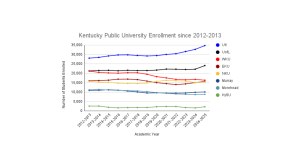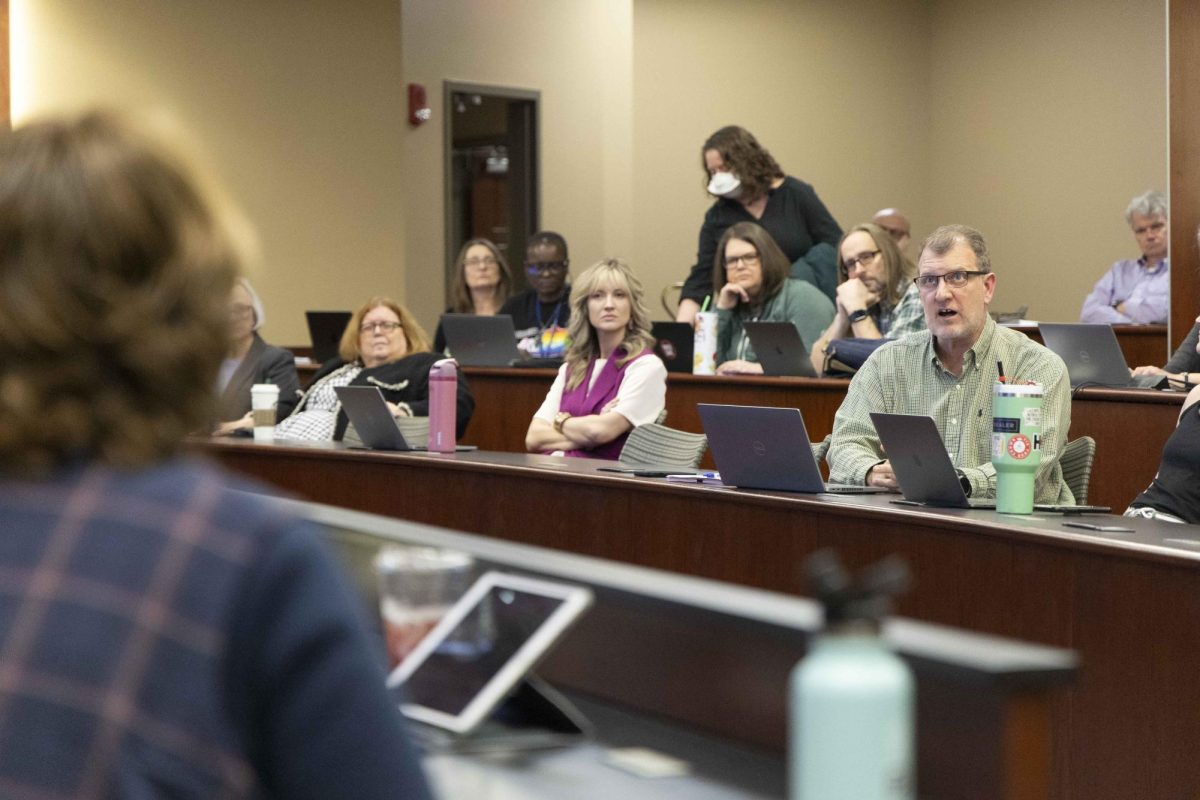Faculty votes not to endorse students’ right to record meetings with professors
October 30, 2018
During the latest University Senate meeting Thursday, a resolution allowing students to freely record conversations with faculty passed by Student Government Association was presented.
Kentucky media attorney Mike Abate said Kentucky is a one-party recording state. This means someone involved in a meeting may record without consent of another party. He explained this doesn’t apply to people uninvolved with the meeting or discussion.
Abate said the university cannot override state law in this matter.
The resolution refers to Kentucky law and stated there is no WKU policy that “prohibits, requires or encourages students recording their meetings with employees of the university, and these recordings would serve as an important layer of protection to all parties involved.”
The resolution further states SGA should ensure students can defend themselves in case of allegations of misconduct stemmed from the meetings. The resolution was passed in SGA during a Sept. 28 meeting and was endorsed by the Senate Executive Committee but not the general faculty senate.
Graduate student James Baugh authored the resolution after he said he was denied the ability to record meetings with a professor during a grade appeal.
“I wanted an objective record, and was denied getting to have an independent third party, as well as being able to record,” Baugh said in a text message. “I was forced to have a closed door, one-on-one meeting if I wanted to appeal my grade, and I was very uncomfortable doing so.”
Baugh said the resolution is important in protecting everyone. He explained that having a recording to look back at means important meetings involving allegations of misconduct or grade appeals wouldn’t rely on faculty memory.
“Without this explicit right, administrators can use other vague guidelines to threaten discipline if you record your meetings, forcing students to decide between giving up their own protection or risking punishment,” Baugh said.
University Senate chair Kirk Atkinson said faculty was split on the resolution during the meeting. For many, he said there was confusion about the necessity for the resolution due to Kentucky law.
“There’s nothing stopping students from recording now,” Atkinson said. “Concern was around people’s perception of what this [the resolution] allowed someone to do differently.”
Some faculty concerns included the possibility of a student “doctoring” or altering a recording with a faculty member. Some faculty also mentioned the resolution could open up a student’s ability to record, share and sell lectures, which violates Kentucky law and intellectual property.
Additionally, some faculty said some conversations would not be appropriate for recordings or may include private information. Atkinson provided an example of one faculty member who holds mentoring meetings with students.
With the mixture of barriers to the resolution being fully endorsed by the Senate, Atkinson said clarification to the resolution could help it pass in the future.
In his time teaching, Atkinson said he never had a student ask to record a meeting or conversation. He said he would want a student to ask and then send a copy of the recording. He explained this would prevent any alterations and would actually make things more clear for himself and the student.
Baugh said he was disappointed in how the Senate handled the meeting. He said he believed it misunderstood certain aspects of the resolution.
“They cited issues like being recorded against their will or students recording their lectures,” Baugh said. “But my resolution doesn’t make those things legal because they already are legal. My resolution merely gives gives students the explicit right to openly record their meetings, encouraging them to do it openly and fairly instead of in secret. How is that not better for everyone, including them?”
Baugh said he intends to amend the resolution with the Senate’s concerns in mind.
Associate professor of sociology Lauren McClain said faculty in the Potter College was directed to not allow student recording at the Senate meeting.
From an administration perspective, McClain said she understands why there may be concerns about students recording faculty, but she also understands students’ concerns. As an example, she said faculty have most of the power in a grade appeal process. Still, she said students should have the right to make their case and ensure their side is represented.
McClain said the ultimate goal and focus should be supporting students and making sure students feel supported by faculty. Her overall concern with colleges preventing students from recording is the apparent mistrust it displays to students. She said rather than directing faculty to prohibit students from recording, which they have a legal right to do, the university could encourage faculty to record those meetings as well.
At the end of the day, McClain said faculty should not be saying anything in a meeting with a student they wouldn’t want recorded.
Dean of Potter College Larry Snyder explained in an email the recommendation against student recording only applies to the grade complaint process. He said it was decided this was within jurisdiction of the college after meeting with the University Counsel and Potter College department heads.
Snyder said faculty within the college are allowed to let students record, but they were advised to take caution and only give consent when they deem a recording appropriate. He said they told faculty they are not required to participate in a meeting to be recorded without their consent and students wanting to record should ask and be given permission.
In the past, Snyder said recordings have been shared without protections against misuse or editing. He said the same concern applies to recordings from the formal grade complaint process, made without consent.
“My sincere hope is that this recommendation engenders genuine and honest dialogue between students and faculty in a professional setting, especially during a grade dispute,” Snyder said. “No one—students or faculty—should be recorded without their consent and, when given, confidence that such a digital document will be used in a responsible manner. It is a matter of mutual respect and right to privacy.”
News editor Rebekah Alvey can be reached at 270-745-6011 and rebekah.alvey660@topper.wku.edu. Follow Rebekah Alvey on Twitter at @bekah_alvey.

















